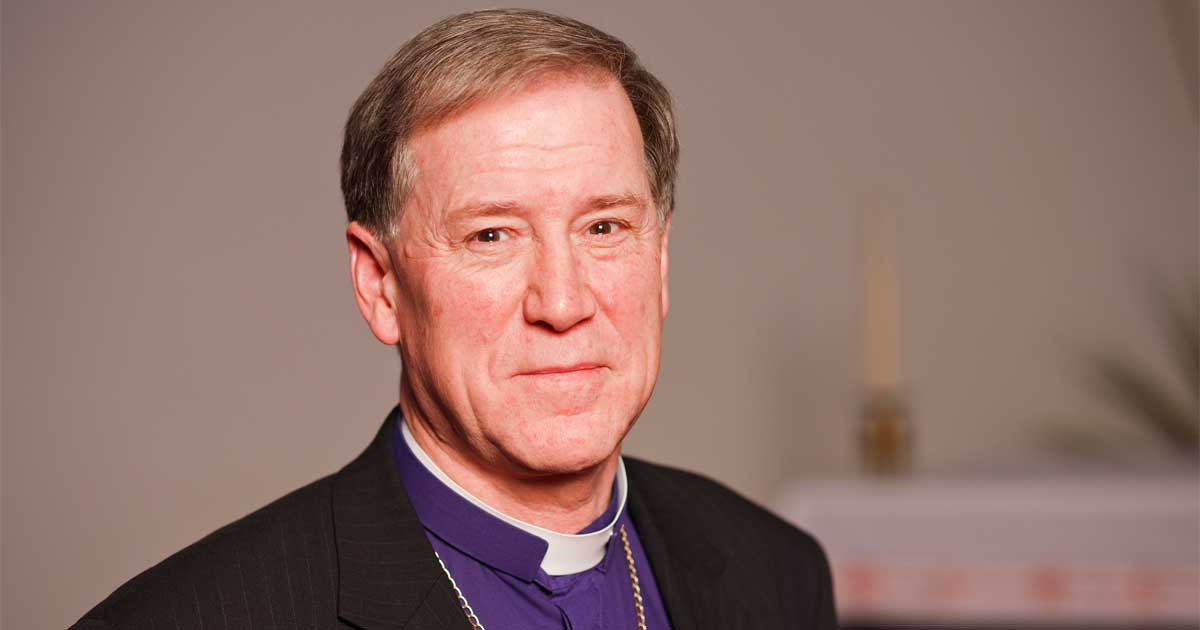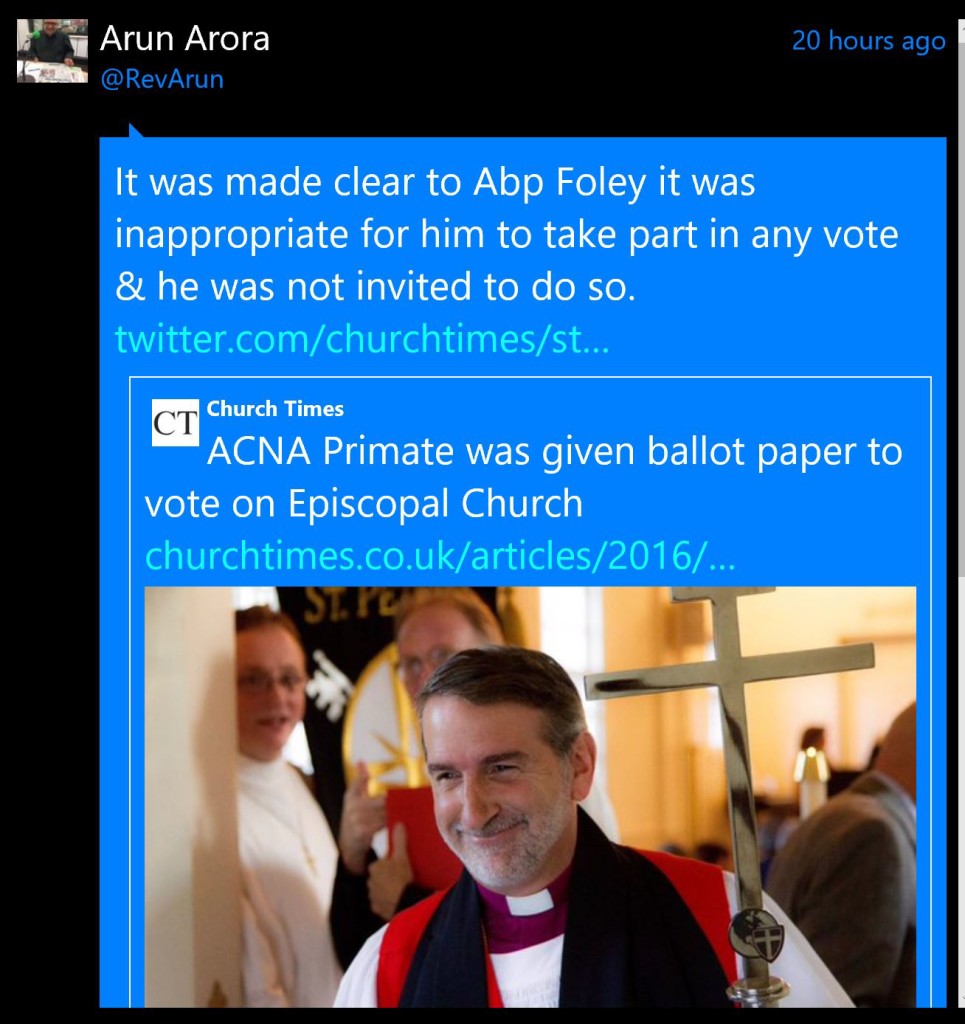The 2016 Primates’ gathering in Canterbury is over and few are happy about the outcome. Liberal Anglicans, particularly in the U.S., are outraged, rebellious and, doing what liberals do best, experiencing pain and reinforcing their victimhood, while conservatives, even the GAFCON primates who attended the gathering, believe the sanctions against TEC were too weak.
The Anglican Church of Canada emerged unscathed because they have not yet adopted a marriage liturgy that accommodates same-sex marriages; the vote to alter the Marriage Canon will occur in 2016 and again in 2019. The sanctioning of TEC will undoubtedly cast a pall over the ACoC 2016 general synod but it’s anyone’s guess whether the threat of similar sanctions will prevent the motion succeeding; my guess is that it won’t.
Since both conservatives and liberals are less than satisfied by the meeting’s outcome, it is reasonable to assume that a compromise has been reached. But what has been compromised?
On the second day, the Archbishop of Uganda, Stanley Ntagali, moved a resolution that asked the Episcopal Church USA and the Anglican Church of Canada to voluntarily withdraw from the meeting and other Anglican Communion activities until they repented. Neither Fred Hiltz nor Michael Curry received this idea with enthusiasm, the resolution failed to pass and Stanley Ntagali left the meeting. He was uncompromising.
The remainder of the conservative Primates stayed to attempt to win support from other undecided Primates and to present the Gospel truth regarding same-sex marriage to the entire meeting. They compromised; I think they would say that they did not compromise the Gospel message, a claim whose truth I would not dispute, but they did make a political compromise. Whether it was a wise compromise, only time will tell, but this is why I think it may not have been:
TEC has been given three years to repent of their actions. Short of a sovereign act of God on a par with parting the Red Sea, TEC will not repent. Every reaction I have seen from TEC clergy has been defiant; their presiding bishop, Michael Curry not only has no intention of repenting but thinks that TEC’s role in the Communion is to convince conservatives of the error of their ways. TEC’s Rev. Gay Jennings serves on the Anglican Consultative Council, a role which, according to the sanction, she will be denied for the next three years; she plans to show up anyway and has defied anyone to stop her. If no one does stop her – and I doubt anyone will – who will stand up to an unrepentant TEC in three years time when secular and, I suspect, mainline church values have become further hardened against an orthodox view of marriage?
Lambeth 1.10 declared that same-sex blessings are unbiblical. That seems to have been forgotten in the Primates’ gathering. The ACoC allows same-sex blessings but, since the rigour of what is permitted or not permitted has loosened, the ACoC has been let off the hook. There has been a sleight of hand a – to use a Welbyesque corporate idiom – moving of the goalposts. In three years time, who knows to what remote region of outer space the goal posts will have been transported?
Sadly, I think the GAFCON primates have been manipulated by Justin Welby. The conservative Primates seem to me to be wonderful Godly men – who are politically naive; I intend that as a compliment.
The underlying problem that did not appear to be addressed in the meeting is that there exist within Anglicanism two different religions. One is orthodox Christianity with 2000 years of history and a consistent understanding of what the Gospel is behind it and the other is, at best, a sub-Christian mish-mash of Unitarian, new-age, relativist, anti-biblical, feel-good religion whose main aim is to reinforce the idea that virtue resides in the acting out of our inner desires no matter what they may be. The two cannot co-exist and a less than definitive censure on the deviant variety may well be worse than none at all, since it makes conservatives complicit in perpetuating the illusion that they can and the illusion of progress where there is nothing but liberal stalling.
Only time will tell – and I hope I am wrong, I really do – but I believe that three years from now TEC will have strengthened their resolve, there will be more committees, more meetings, more dialogue, more listening. The only thing missing will be a resolution to the problem.
Like this:
Like Loading...




 Throughout the meeting of the Primates last week, I thought much about St. Paul’s teaching about the Church being the Body of Christ in the world. It is the image at the very heart of Anglican ecclesiology. It informs the manner of our relationships in the Church local, national and global. In 165 countries we are 85 million people proclaiming the Gospel of Christ in more than 1000 languages. We are a family of autonomous Churches that understand ourselves to be “Formed by Scripture, Shaped by Worship, Ordered for Communion, and Directed by God’s Mission”. We are bound together by the long held principle of “Mutual Responsibility and Interdependence in the Body of Christ” articulated at the great Anglican Congress of 1963 in Toronto.
Throughout the meeting of the Primates last week, I thought much about St. Paul’s teaching about the Church being the Body of Christ in the world. It is the image at the very heart of Anglican ecclesiology. It informs the manner of our relationships in the Church local, national and global. In 165 countries we are 85 million people proclaiming the Gospel of Christ in more than 1000 languages. We are a family of autonomous Churches that understand ourselves to be “Formed by Scripture, Shaped by Worship, Ordered for Communion, and Directed by God’s Mission”. We are bound together by the long held principle of “Mutual Responsibility and Interdependence in the Body of Christ” articulated at the great Anglican Congress of 1963 in Toronto.